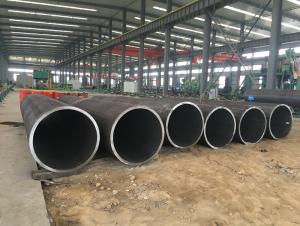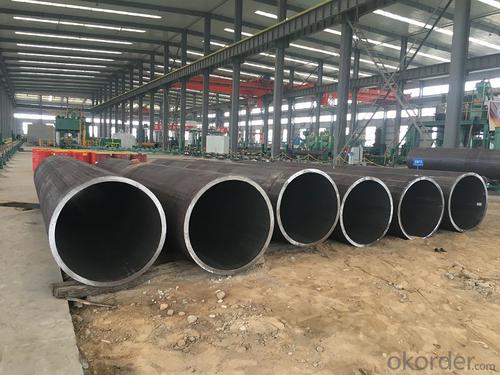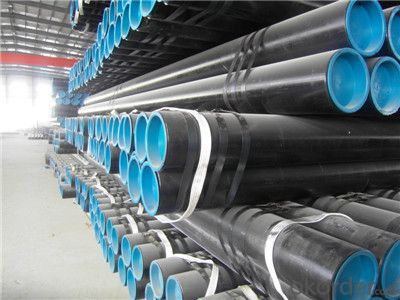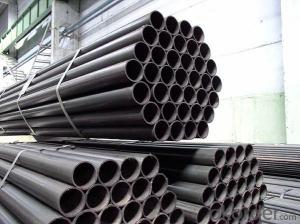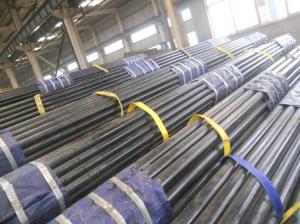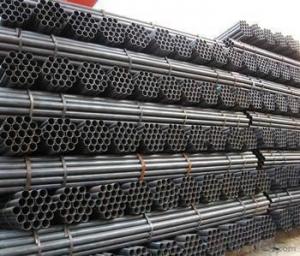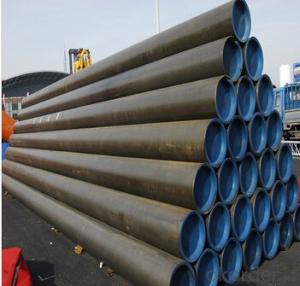Seamless black steel pipes for water gas
- Loading Port:
- Tianjin
- Payment Terms:
- TT or LC
- Min Order Qty:
- 20 m.t.
- Supply Capability:
- 14000 m.t./month
OKorder Service Pledge
OKorder Financial Service
You Might Also Like
1、Structure of Seamless black steel pipes for water gas:
Seamless pipe is formed by drawing a solid billet over a piercing rod to create the hollow shell. As the manufacturing process does not include any welding, seamless pipes are perceived to be stronger and more reliable. Historically seamless pipe was regarded as withstanding pressure better than other types, and was often more easily available than welded pipe.
2、Main Features of Seamless black steel pipes for water gas:
• High manufacturing accuracy
• High strength
• Small inertia resistance
• Strong heat dissipation ability
• Good visual effect
• Reasonable price
3、Seamless black steel pipes for water gas Specification:
Standard | GB, DIN, ASTM ASTM A106-2006, ASTM A53-2007 |
Grade | 10#-45#, 16Mn 10#, 20#, 45#, 16Mn |
Thickness | 8 - 33 mm |
Section Shape | Round |
Outer Diameter | 133 - 219 mm |
Place of Origin | Shandong, China (Mainland) |
Secondary Or Not | Non-secondary |
Application | Hydraulic Pipe |
Technique | Cold Drawn |
Certification | API |
Surface Treatment | factory state or painted black |
Special Pipe | API Pipe |
Alloy Or Not | Non-alloy |
Length | 5-12M |
Outer Diameter | 21.3-610mm |
Grade | 20#, 45#, Q345, API J55, API K55, API L80, API N80, API P110, A53B |
Standard | ASME, ASTM |
1) Material:20#(ASTM A 106/A53 GRB.API5LGRB,GB),45#,16Mn,10#.
2) Specification range:OD:21.3-610mm,WT:6-70mm,length:6-12m or according to the requirement of clients.
3) Excutive standards:GB,ASME API5L.ASTM A 106/A53,Despite of the above standards,we can also supply seamless steel pipe with standard of DIN,JIS,and so on,and also develop new products according to the requirements of our clients!
4) Surface:black lacquered,varnish coating or galvanized.
5) Ends:Beveled or square cut,plastic capped,painted.
6) Packing:bundles wrapped with strong steel strip,seaworthy packing.
4、Packaging & Delivery
Packaging Details: | seaworthy package,bundles wrapped with strong steel strip |
Delivery Detail: | 15-30days after received 30%TT |
5、FAQ of Seamless black steel pipes for water gas:
①How is the quality of your products?
Our products are manufactured strictly according to national and internaional standard, and we take a test
on every pipe before delivered out. If you want see our quality certifications and all kinds of testing report, please just ask us for it.
Guaranteed: If products’ quality don’t accord to discription as we give or the promise before you place order, we promise 100% refund.
②How about price?
Yes, we are factory and be able to give you lowest price below market one, and we have a policy that “ for saving time and absolutely honest business attitude, we quote as lowest as possible for any customer, and discount can be given according to quantity”,if you like bargain and factory price is not low enough as you think, just don’t waste your time.Please trust the quotation we would give you, it is professional one.
③Why should you chose us?
Chose happens because of quality, then price, We can give you both.Additionally, we can also offer professional products inquiry, products knowledge train(for agents), smooth goods delivery, exellent customer solution proposals.Our service formula: good quality+good price+good service=customer’s trust
SGS test is available, customer inspection before shipping is welcome, third party inspection is no problem.
6、Seamless Pipe ASTM A106/53Seamless black steel pipes for water gas
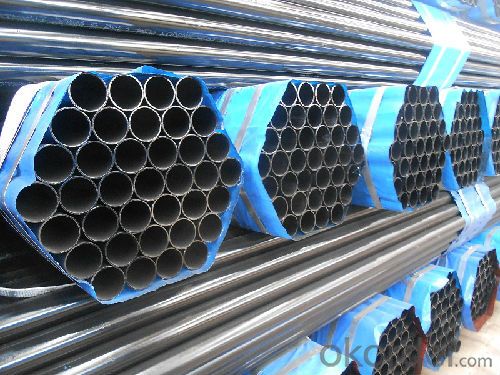
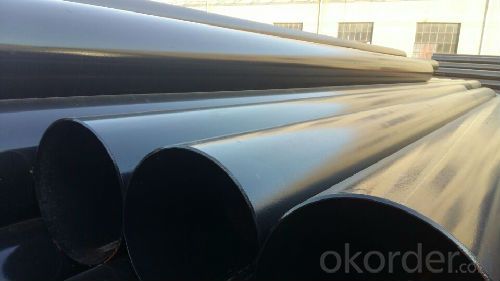
- Q: What is the pressure rating of steel pipes?
- The pressure rating of steel pipes varies depending on its size, wall thickness, and the type of steel used. It can range from a few hundred pounds per square inch (psi) for smaller pipes to several thousand psi for larger ones.
- Q: How are steel pipes connected together?
- Steel pipes are typically connected together using various methods such as welding, threading, or using couplings.
- Q: What is the role of steel pipes in power plants?
- Steel pipes play a crucial role in power plants as they are used for the transportation of various fluids, such as water, steam, and oil, throughout the facility. They provide a reliable and durable means of conveying these substances under high pressure and extreme temperatures, ensuring the smooth operation of power generation processes. Additionally, steel pipes are also utilized for structural support in power plant construction, serving as a vital component in the overall infrastructure of the facility.
- Q: What are the different types of steel pipe flanges?
- There are several types of steel pipe flanges, including slip-on flanges, weld neck flanges, socket weld flanges, threaded flanges, blind flanges, and lap joint flanges. Each type has unique features and is used in specific applications based on factors such as pressure ratings, pipe size, and end connections.
- Q: Are steel pipes resistant to impact?
- Yes, steel pipes are generally resistant to impact due to their high strength and durability. They can withstand external forces and are less likely to deform or break upon impact compared to other materials.
- Q: What are the applications of galvanized steel pipes?
- Galvanized steel pipes have a wide range of applications in various industries. They are commonly used in plumbing systems to deliver water and gas due to their excellent corrosion resistance. Additionally, they are used in the construction industry for structural purposes, such as scaffolding, fences, and handrails. Galvanized steel pipes are also utilized in the agricultural sector for irrigation systems and as posts for supporting crops. Furthermore, they find usage in oil and gas pipelines, HVAC systems, and automotive manufacturing. Overall, the applications of galvanized steel pipes are diverse, making them an essential material in multiple sectors.
- Q: Are steel pipes suitable for industrial applications?
- Yes, steel pipes are highly suitable for industrial applications. Steel pipes possess excellent strength, durability, and corrosion resistance, making them ideal for transporting fluids, gases, and solid materials in various industries such as oil and gas, construction, automotive, and manufacturing. Additionally, steel pipes can withstand high pressure, extreme temperatures, and harsh environmental conditions, making them reliable and efficient for industrial operations.
- Q: What are the factors affecting the price of steel pipes?
- The price of steel pipes can be influenced by various factors. These factors encompass: 1. Raw material expenses: The cost of raw materials like iron ore and coal significantly influences the price of steel pipes. Fluctuations in commodity prices can impact the overall production cost and subsequently affect the selling price. 2. Supply and demand dynamics: The price of steel pipes is determined by the interplay of supply and demand. When there is high demand and limited supply, prices tend to rise. Conversely, an oversupply and low demand can lead to price decreases. 3. Production and manufacturing costs: The direct impact of production and manufacturing expenses on steel pipe prices cannot be overlooked. Costs related to labor, energy, transportation, and equipment maintenance all contribute to the overall production cost and, consequently, the selling price. 4. Market competition: The level of competition within the steel pipe industry also influences prices. Increased competition among manufacturers and suppliers can result in more competitive pricing. Conversely, fewer competitors may lead to higher prices due to limited options. 5. Government policies and regulations: Government policies and regulations exert a significant influence on steel pipe prices. Import tariffs, trade restrictions, and environmental regulations can all affect production costs and subsequently impact prices. 6. Currency exchange rates: Currency exchange rates can also sway steel pipe prices. Fluctuations in exchange rates between countries can impact the cost of importing or exporting steel pipes, which in turn affects their selling price. 7. Global economic conditions: The overall state of the global economy can have repercussions on steel pipe prices. During periods of economic growth, demand for steel pipes may increase, leading to higher prices. Conversely, economic downturns can result in decreased demand and subsequently lower prices. It is vital to acknowledge that these factors can interact and fluctuate over time, making the pricing of steel pipes a complex and ever-changing process.
- Q: What does "buried steel pipe" 6*2SC100 mean?
- This is the electrical drawings, such as water supply and drainage, HVAC is that DN, SC is the laying of electrical wiring, which is defined as threading pipe laying. 100 is the nominal diameter of the pipe, unit millimeters.
- Q: What is the fire rating of steel pipes?
- Several factors determine the fire rating of steel pipes. Steel possesses inherent fire resistance due to its high melting point and low thermal conductivity. However, the fire rating of steel pipes can be further improved by employing fire-resistant coatings or insulation materials. These additional measures can offer different levels of fire protection, typically quantified by how long the pipes can retain their structural integrity during a fire situation. The precise fire rating of steel pipes may differ depending on the thickness and type of coating or insulation employed. To ascertain the appropriate fire rating requirements for specific applications, it is crucial to refer to industry standards, such as those established by organizations like the National Fire Protection Association (NFPA), or consult with fire safety professionals.
Send your message to us
Seamless black steel pipes for water gas
- Loading Port:
- Tianjin
- Payment Terms:
- TT or LC
- Min Order Qty:
- 20 m.t.
- Supply Capability:
- 14000 m.t./month
OKorder Service Pledge
OKorder Financial Service
Similar products
Hot products
Hot Searches
Related keywords
